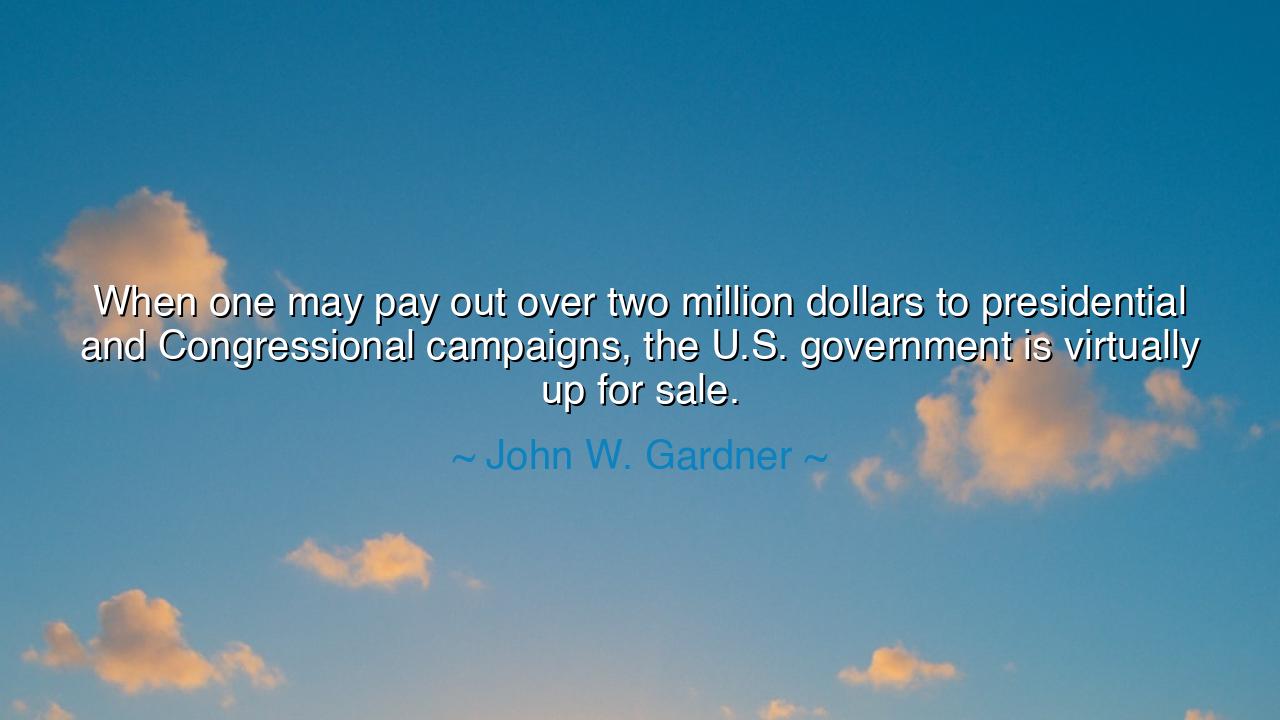
When one may pay out over two million dollars to presidential and
When one may pay out over two million dollars to presidential and Congressional campaigns, the U.S. government is virtually up for sale.






The words of John W. Gardner ring like a solemn prophecy carved into the stone of democracy: “When one may pay out over two million dollars to presidential and Congressional campaigns, the U.S. government is virtually up for sale.” It is a cry not only of warning but of mourning—for a republic that risks forgetting its own soul. Gardner, a reformer and statesman who once served under President Lyndon B. Johnson, uttered these words in the twentieth century, yet they echo truths that have haunted nations for millennia. He spoke not as a cynic but as a guardian of conscience, urging a people to remember that freedom dies not only by tyranny of the sword, but by the corruption of gold.
In the ancient tongue, we might say that Gardner saw the creeping shadow of plutocracy—the rule of the wealthy, where money becomes the master and the will of the people the servant. His warning was clear: when elections are fueled not by ideas but by fortunes, when the halls of power echo with the voices of donors rather than citizens, then democracy itself begins to rot from within. Two million dollars—a sum vast in his time—was not merely a figure; it was a symbol of imbalance, a measure of how influence had been purchased while integrity was pawned. The people still voted, yes, but the game had already been rigged by those who could afford to play.
History is full of such moments when wealth has corrupted the noble design of governance. In the final days of the Roman Republic, senators bought their way into office, and generals bought their armies’ loyalty. The republic’s ideals—virtue, duty, service—were drowned in gold. The historian Sallust wrote that “ambition drove many men to become false,” and soon, Rome exchanged her freedom for the promise of stability under an emperor. Gardner, in his wisdom, saw the same peril lurking beneath the marble of the American Capitol. His words were not against wealth itself, but against the poison of unrestrained power, when riches and politics intertwine like serpents around the tree of liberty.
Even in modern times, this truth has not faded. Consider the rise of Super PACs and vast networks of donors whose money floods the veins of campaigns. The ordinary citizen, who was once the cornerstone of democracy, now finds his voice drowned by the roar of sponsored influence. When a politician’s loyalty is divided between the people and their financiers, the promise of equality falters. And yet, Gardner’s message is not a call to despair—it is a call to vigilance. He reminds us that the price of liberty is not only eternal vigilance against foreign foes, but also against corruption within our own walls.
Let us not mistake his words as hatred of wealth, for Gardner was no enemy of success. Rather, he believed that wealth must serve the common good, not buy dominion over it. He called upon citizens to demand transparency, to strengthen laws that guard against corruption, and to reclaim their rightful place as the true source of power. For if the government is “virtually up for sale,” then the people have become customers in their own house, rather than its owners. The remedy, he believed, was moral courage—that same courage which built the nation: to speak, to reform, to refuse the silence that corruption feeds upon.
Consider the example of Theodore Roosevelt, who, in the early twentieth century, faced down the great industrial trusts that had entangled themselves in government affairs. He declared that no man, however rich or powerful, should rule the nation from the shadows. His courage broke monopolies and reminded America that leadership was not for sale, but for service. Roosevelt’s deeds are the living echo of Gardner’s truth: that the republic must serve all, or it will soon serve none.
So, my children of the future, remember this: money is a fine servant but a terrible master. Do not let it purchase your silence or your faith. Demand honesty from those who lead, and humility from those who seek power. Give your loyalty not to wealth, but to wisdom; not to donors, but to duty. A nation’s greatness does not lie in its riches, but in the righteousness of its people.
And when you see corruption take root, do not turn away. Speak, act, and stand firm, for every voice raised in truth is stronger than gold. As Gardner teaches, the soul of democracy cannot be bought—it must be guarded, with vigilance and virtue, by every citizen who dares to remember that government belongs not to the highest bidder, but to the people whose hope and labor sustain it.






AAdministratorAdministrator
Welcome, honored guests. Please leave a comment, we will respond soon